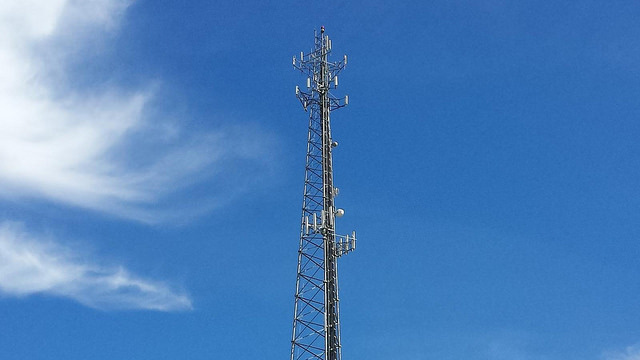by David Kravets - May 5, 2015 3:25pm PDT ars technica

Michael Dorausch
A federal appeals court ruled Tuesday that the government does not need a warrant to obtain a suspect's cell-site location data records.
The 9-2 decision (PDF) by the 11th US Circuit Court of Appeals said that the records of towers that a mobile phone uses to make calls are considered "business records" maintained by a "third party" and are not protected by the Fourth Amendment. That means the government may obtain these records if it believes they are relevant to an investigation.
The case concerns a Florida man, Quartavious Davis, who was sentenced to life in prison for a string of robberies in a prosecution that was built with the suspect's cell site records.
...Davis can assert neither ownership nor possession of the third-party’s business records he sought to suppress. Instead, those cell tower records were created by MetroPCS, stored on its own premises, and subject to its control. Cell tower location records do not contain private communications of the subscriber. This type of non-content evidence, lawfully created by a third-party telephone company for legitimate business purposes, does not belong to Davis, even if it concerns him. Like the security camera surveillance images introduced into evidence at his trial, MetroPCS’s cell tower records were not Davis’s to withhold. Those surveillance camera images show Davis’s location at the precise location of the robbery, which is far more than MetroPCS’s cell tower location records show.
The majority ruling by Judge Frank Hull is a big boost to the government. Warrantless cell-site tracking has become among the government's preferred methods of electronically tracking suspects in the wake of a 2012 Supreme Court ruling that the authorities generally needed a warrant to attach GPS devices onto vehicles and track their every move.
Meanwhile, the Atlanta-based appeals court had ruled the opposite way last year by a vote of 2-1. But the 11th Circuit revisited the case with a larger panel of 11 judges at the government's request. The outcome brings the number of appellate courts that have ruled for the authorities to four. There are 13 appeals courts nationwide. None have gone the other way. Without conflicting rulings, the US Supreme Court might not take up the issue any time soon.
In all the decisions, the appellate courts cited analog-aged 1979 US Supreme Court precedent, known as Smith v. Maryland, that allows the government's telephone metadata snooping program that Edward Snowden exposed.
Orin Kerr, a former federal prosecutor and a Fourth Amendment expert, said he agreed with the court's ruling—to an extent.
Granted, I want there to be a circuit split to get the case up to the Supremes. That leaves me in an odd position: Although I think a judge should follow Smith, I also kinda want a lower court to not follow precedent in order to tee up the issue for the Supreme Court.
The 11th Circuit originally decided in June that a warrant was required because the public had a reasonable expectation of privacy in their public movements.
"Thus, the exposure of the cell site location information can convert what would otherwise be a private event into a public one. When one’s whereabouts are not public, then one may have a reasonable expectation of privacy in those whereabouts," the court ruled. (PDF)
But what a different a larger panel of judges makes when it comes to deciding the constitutionality of so-called § 2703(d) orders:
The stored telephone records produced in this case, and in many other criminal cases, serve compelling governmental interests. Historical cell tower location records are routinely used to investigate the full gamut of state and federal crimes, including child abductions, bombings, kidnappings, murders, robberies, sex offenses, and terrorism-related offenses.
Such evidence is particularly valuable during the early stages of an investigation, when the police lack probable cause and are confronted with multiple suspects. In such cases, § 2703(d) orders—like other forms of compulsory process not subject to the search warrant procedure—help to build probable cause against the guilty, deflect suspicion from the innocent, aid in the search for truth, and judiciously allocate scarce investigative resources.
For the two-judge dissent, Judge Beverly Martin wrote:
"While I admire the majority’s attempt to cabin its holding to the technology of five years ago, its assurances in this regard seem naïve in practice. As a result of today’s decision, I have little doubt that all government requests for cell site location data will be approved, no matter how specific or invasive the technology."
The MetroPCS records at issue in the case were from August 1, 2010 to October 6, 2010. The defendant, Davis, made roughly 86 calls a day.
The data included the telephone numbers of calls made by and to Davis' mobile phone; whether a call was outgoing or incoming; the date, time and duration of calls. The key dispute in this case concerned other data that was turned over. That included the number assigned to the cell tower that wirelessly connected the calls from and to Davis, and the sector number associated with the tower.
Davis' attorney, Nathan Freed Wessler of the American Civil Liberties Union, said that the "dissenting judges recognized outdated legal doctrines from the analog age should not be mechanically extended to undermine our privacy rights in the voluminous digital records that come with modern life."

David Kravets / The senior editor for Ars Technica. Founder of TYDN fake news site. Technologist. Political scientist. Humorist. Dad of two boys. Been doing journalism for so long I remember manual typewriters with real paper.

No comments:
Post a Comment